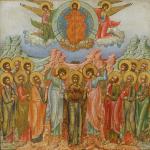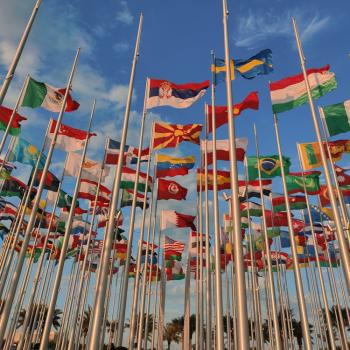
When a unique, personal human life begins, is not something easy to discern; indeed, the more we try to examine all that we know about the formation of human life, and consider the implications of we have learned, it becomes more and more difficult to say anything definitive. Science does not know the answer. What it does tell us is the processes which are used to establish that life. What it cannot tell is when we have a living human person. What science shows us is interpreted by us when we try to make such a determination, and just as it is wrong for Christians to confuse their interpretations of Scripture with Scripture, so it is wrong for us to suggest our interpretations of scientific facts is what is said by science. Philosophical notions concerning life and personhood are what we use to generate our answer. Those notions, of course, are not shared by all, which is why different people will come to different conclusions concerning the scientific data. Theologically, there is no one definitive answer. This is why, when the Congregation Of The Doctrine Of Faith made a declaration about ensoulment, that is, when the “spiritual soul” which makes for a unique person is first present in the developing embryo, it said that the answer has not been determined by the church:
This declaration expressly leaves aside the question of the moment when the spiritual soul is infused. There is not a unanimous tradition on this point and authors are as yet in disagreement. For some it dates from the first instant; for others it could not at least precede nidation. It is not within the competence of science to decide between these views, because the existence of an immortal soul is not a question in its field. It is a philosophical problem from which our moral affirmation remains independent for two reasons: (1) supposing a belated animation, there is still nothing less than a human life, preparing for and calling for a soul in which the nature received from parents is completed, (2) on the other hand, it suffices that this presence of the soul be probable (and one can never prove the contrary) in order that the taking of life involve accepting the risk of killing a man, not only waiting for, but already in possession of his soul.[1]
The church says it would be morally wrong for us to either perform or procure an elective abortion, that is, directly seeking to have an abortion, and having one with no justifying circumstances. The church has come to conclude that actions saving the life of a woman which might lead to an unintended abortion can be seen as justifiable. But what is important for us to recognize here is that, as the Congregation for the Doctrine of Faith indicated, this prohibition is not linked to the question of ensoulment. “The Magisterium has not expressly committed itself to an affirmation of a philosophical nature, but it constantly reaffirms the moral condemnation of any kind of procured abortion”.[2] However, we must recognize that, when we look to history, the response to abortion, the kind of moral gravity which was assumed in its performance, often took into consideration many factors, including when it took place in the pregnancy:
In the course of history, the Fathers of the Church, her Pastors and her Doctors have taught the same doctrine – the various opinions on the infusion of the spiritual soul did not introduce any doubt about the illicitness of abortion. It is true that in the Middle Ages, when the opinion was generally held that the spiritual soul was not present until after the first few weeks, a distinction was made in the evaluation of the sin and the gravity of penal sanctions. Excellent authors allowed for this first period more lenient case solutions which they rejected for following periods. But it was never denied at that time that procured abortion, even during the first days, was objectively grave fault. This condemnation was in fact unanimous. Among the many documents it is sufficient to recall certain ones. [3]
What the church condemned, therefore, was the act of elective abortion itself, and the church indicated various consequences for those who either performed or procured an elective abortion. What we do not see is condemnations given to those who differed as in how society itself should deal with abortion and its legalization. Until the modern age, it was quite common to accept abortion being legal at least until the time of quickening, that is, until the time the baby’s movement could be felt. No condemnation was given to those who held that view, and no one said that those who held it were guilty of whatever abortions happened as a result of such legality. This is because, like Aquinas, they did not confuse legalization with the promotion of or support of the act which is legalized. And those who made this distinction believed it was likely what happened in such an abortion was less grave than what happened after the moment of quickening. We find many following integralism are those who seek to undermine this normative approach to positive law with an ideology that seeks to have all moral evils condemned by positive law, suggesting that those who do not do so are guilty of the evils they think society should allow. This approach to politics and society was never promoted or accepted by Christian tradition, because it is understood to be oppressive in nature, limiting the kind of freedom God gave humanity. And, as Aquinas and others understood, often when positive law tries to restrict certain activities, it actually makes the situation worse, as can be seen in recent times with the problems associated with prohibition. Our desire should be to make the situation better, not worse, and so engage our concerns with prudence. And when we look into abortion, it appears that making it illegal does not actually do what we desire; indeed, with the statistics which we have, arguments can be made that the rate of abortion and the abuses which go along with it go down when it is legal. If we truly are concerned about abortion, we should want the situation which makes for its least use; and if some politician were to believe the statistics which suggest abortion rates have gone down after its legalization, that could make them think, prudentially, the best thing to do is keep it legal so that there is less actual abortion occurring. They should be treated fairly and with charity. Just as Thomas Aquinas was not seen as a pimp because he supported, with such reasoning, the legalization of prostitution (and so was not denied communion because of his stand), those who engage abortion in this manner should not be treated as abortionists (nor treated as if the violated canons concerning the actual engagement of abortion).
When dealing with abortion, many people think the Christian tradition, and the biological sciences, indicates more than they do; they make all kinds of logical leaps to create conclusions which do not necessarily follow the premises which they use. One of those conclusions is the notion that ensoulment necessarily happens at conception. This is something we do not know. Those who think biology promotes this notion have not examined what the biological sciences actually observe, for if they did, they would see the question of the time of ensoulment is made much more difficult, not less, by what happens in the womb. For example, we would have to deal with the problem of monozygotic twins, that is, twins which develop out of one fertilized egg. A fertilized egg, sometime after conception, splits, and in this fashion, creates identical twins. Are we going to deny those twins are two distinct persons? Are we going to say that because they developed out of one conception, they only have one soul between then, and so in reality, though they appear to be two people, really are one person? Or are we going to say that conception doesn’t necessarily mean there is only one unique person when an egg is fertilized? But if that is the case, is it possible that there might be situations in which there is no ensoulment when an egg is fertilized, and as such, explain at least some of the miscarriages? If some are to assert that we can observe a fertilized egg is growing, and so has some sort of movement of its own, as proof that ensoulment has taken place, should we then suggest sperm, which move on their own, are unique ensouled persons as well? If some want to invoke the incarnation or the immaculate conception, and use them to suggest ensoulment necessarily takes place at conception, the reply is easy, as it is clear both instances are special conceptions which transcend the ordinary process of human creation (after all, Jesus did not have a human father, and so assumed humanity or “took on flesh” in a way without a normal conception, and Mary’s conception was miraculous, which is why it was able to be immaculate). Similarly, those who quote Jeremiah 1:5 as proof of ensoulment do not really look at what the verse is saying: “Before I formed you in the womb I knew you, and before you were born I consecrated you; I appointed you a prophet to the nations” (Jer. 1:5 RSV). Jeremiah was appointed by God before he was “formed in the womb,” that is, before conception. It is best to read this verse as a demonstration of God’s eternal preordination of Jeremiah and Jeremiah’s mission in the world, and not Jeremiah’s ensoulment; God knew Jeremiah from eternity, even as God knows us from eternity, before, that is, we are formed in the womb.
Certainly, there are good philosophical and theological arguments which suggest ensoulment happens at conception, but, as the church recognizes, those position are not necessary, and we are dealing with matters which lay beyond our knowledge. No matter what answer we give as to when ensoulment takes place, there are many difficulties which arise as a consequence of our conclusion, such as what we are to make of the great number of miscarriages, spontaneous abortions, if we think ensoulment necessarily takes place at conception. This is why, even if many theologians and officials in the church learn towards the belief that ensoulment happens at fertilization, the church does not require such a belief, and has recognized other notions, such as quickening, as being determinative when ensoulment takes place.[4] What the church expects is for us to treat what is conceived as if it were a person, not that it says it knows it is a fully ensouled person:
Thus the fruit of human generation, from the first moment of its existence, that is to say from the moment the zygote has formed, demands the unconditional respect that is morally due to the human being in his bodily and spiritual totality. The human being is to be respected and treated as a person from the moment of conception; and therefore from that same moment his rights as a person must be recognized, among which in the first place is the inviolable right of every innocent human being to life. This doctrinal reminder provides the fundamental criterion for the solution of the various problems posed by the development of the biomedical sciences in this field: since the embryo must be treated as a person, it must also be defended in its integrity, tended and cared for, to the extent possible, in the same way as any other human being as far as medical assistance is concerned. [5]
Of course, saying we must work to support life, and respect the fertilize egg as if it were already a human person (because it might be) does not indicate how we are to do this. We see, for example, few if any are trying to do something about the massive number of miscarriages which take place (a number which far exceeds the number of elective abortions). Indeed, it seems if we treated that problem seriously, and tried to do something about it, much harm would result, because we would not fix the problem (miscarriages would still occur) and yet we would make the situation much worse (having women to go through various undignified procedures and experimentations which would put them, and the fetus, at risk). Letting things be seems to be the better course of action. Similarly, then, when dealing with elective abortion, there can be many ways in dealing with the problem; we must recognize, with charity, that people are trying to deal with the problem the best they can. We should not suggest those who disagree with our means (and so our analysis of what is best) are to be seen as if they are forcing women to have abortions. They are, rather, trying to deal prudentially with an issue that has several considerations involved, considerations which include the health and welfare of pregnant women. If they were doing all that they could do to make women have abortions, that would be a different matter, and they would be rightfully criticized and condemned for such an action. This, however, is not what they are doing; if we were to judge them as if they were is a misrepresentation them, indeed, likely based upon great uncharity on our part, and as such, we risk being condemned for our mistaken or false judgment. Indeed, with such a breach of charity, we should consider if we are the ones who might need an examination of conscience and metanoia before receiving communion.
[1] Sacred Congregation for the Doctrine of Faith, “Declaration On Procured Abortion” (11-18-1974). Footnote 19.
[2] Sacred Congregation for the Doctrine of Faith, “Instruction on Respect For Human Life In Its Origin And the Dignity Of Procreation Replies To Certain Questions of the Day” (2-22-1987).
[3] Sacred Congregation for the Doctrine of Faith, “Declaration On Procured Abortion,” ¶7.
[4] Perhaps there really is no one time, but each person, each pregnancy has a different time in which ensoulment occurs.
[5] Sacred Congregation for the Doctrine of Faith, “Instruction on Respect For Human Life In Its Origin And the Dignity Of Procreation Replies To Certain Questions of the Day.”
Stay in touch! Like A Little Bit of Nothing on Facebook.
If you liked what you read, please consider sharing it with your friends and family!













